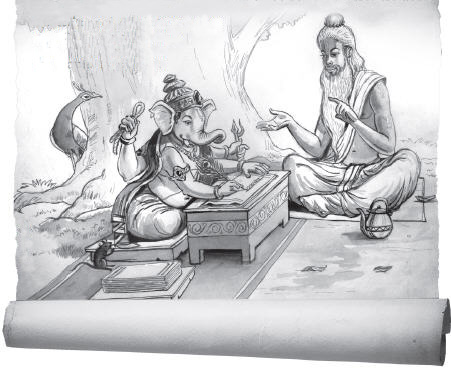The scripting of Mahabharata displays a special mood of mutual love.

Vedic deities are very popular in and around the Indian subcontinent. It is not uncommon to find ancient deities such as Lord Ganesha and Lord Rama even in distant lands like Malaysia and Indonesia. Try as he might, the modern man finds it difficult to abandon his affinity for them. Sometimes, however, this multitude of deities seems to create an idea of pantheism in the immature minds of the uninformed. Some even go to the extent of imagining some form of rivalry between these deities. To understand the reality better, let us examine a pivotal incident from time bygone.
We have to travel back in time around 5,000 years. The end of Dvapara-yuga loomed ahead on the horizon of time. Srila Vyasadeva, impelled by compassion for the masses of the future, thought of putting down in writing all knowledge that was available at that time in sound form. The advanced people of his time, described as srutidhara, remembered for posterity all that was heard even once during their lifetimes. Foreseeing the world of Kali-yuga, Vyasadeva envisaged the next age as an age of diminishing competence. Human capabilities would dwindle and frailties would rise. Intelligence and memory would decline. Many other limitations would become prominent. To help the needy, Vyasadeva compiled the Veda and then divided it into four, viz. Sama, Yajur, Rg and Atharva. After this, he further explained the text in histories called Puranas. At this point he felt that these texts would be difficult for the common man of Kali-yuga to comprehend. He wished to compile for them something that would explain the same subject matter of the Vedas in a simple, attractive and lucid form, easily understandable by ordinary man. At this point he thought of compiling the Mahabharata, the epic narration of the activities of the greatest dynasty of Bharata-varsa.
Wanting to express his approval, Lord Brahma gave his blessings to Srila Vyasadeva by mentioning, asya kavyasya kavayo na samartha visesane (Mahabharata, Adi, 1.73): the greatest poets of this world will not be able to compose a better composition than this one. He then advised Vyasa to take help from Lord Ganesha for the purpose of writing the composition.
Even though Vyasadeva had a son of the caliber of Srila Sukadeva Goswami and disciples like Vaisampayana, Lord Brahma’s selection for this valuable task was Ganesha. It is also interesting to note that Vyasa himself is an incarnation of Narayana and whenever anyone chants the Vedic literature, one offers obeisances to him. Before reaching this point, Srila Vyasadeva had already compiled the Vedas and had even summarized it in the form of the Vedanta-sutras. Clearly, there is no doubt about the capabilities of the compiler himself or his followers in the form of his son or his disciples. Yet, Lord Brahma ordered Vyasa to commission Lord Ganesha for this important service. Clearly Lord Ganesha is a personality specially chosen for this important service.
Following the great authority Lord Brahma, when Srila Vyasadeva called upon Ganesha, the text was ready in the mind of Vyasadeva, but as advised by Lord Brahma, he requested Ganesha to help him write it down. It is mentioned in the Mahabharata(Adi Parva, 1.78-79)
srutvaitat praha vighneso
yadi me lekhani ksanam
likhato navatistheta tada
syam lekhako hyham
“Hearing this Lord Ganesha said, ‘O Vyasa! I shall agree on one condition while writing, my pen shouldn’t stop even for a moment.’”
Vyasa replied, vyaso ’pyuvaca tam devama-buddhva ma likha kvacit omityuktva ganeso ’py babhuva kila lekhakaù: “You too may not write a single alphabet without properly understanding its meaning.” Lord Ganesha gave his assent by replying with the ‘Om’ sound and thus agreed to write.
The counter-condition put forward by Vyasa is another striking feature of this whole episode. The Mahabharata primarily follows the lives of the Pandavas, who as staunch and unshakeable devotees of Lord Krishna faced many difficulties in their lives. Yet in the face of reversals, their devotion to Lord Krishna never wavered. The culmination of this poetry is in the great war. The best of all instructions, the Bhagavad-gita, was spoken by Lord Krishna just before the start of this war to guide His dear devotee Arjuna. The Bhagavad-gita is glorified as a succinct spiritual textbook taking its hearer(or reader) from the basics to the advanced levels of spirituality. For this, it is highly respected throughout the world.
The text clearly explains how the pantheism that is alleged by modern man against the Vedic conception of authority is not true, and establishes clearly Lord Krishna’s position and His relationship with other deities (Bg. 7.20-23 and 9.20-24). It is clear and transparent for the student to understand that there is no such thing as rivalry even in a subtle form between the different Vedic deities. The Vedic texts certainly do not promote pantheism of any sort. And if this was written by Ganesha, then as per Vyasa’s condition, he must have understood these concepts clearly before writing them down. If these words would have explained anything contradictory to the real understanding, Lord Ganesha wouldn’t have put it down in writing. Thus, this simple incident proves that the Vedic deities are in harmony with each other and Lord Ganesha is happy to render service of glorifying Lord Krishna, by glorifying His words that form a part of the Mahabharata.
Nanda Dulala Dasa has a bachelor’s degree in Mechanical Engineering. He is a part of the editorial team of Indian English BTG. He stays at ISKCON Mumbai where he teaches Krishna consciousness to college students.
